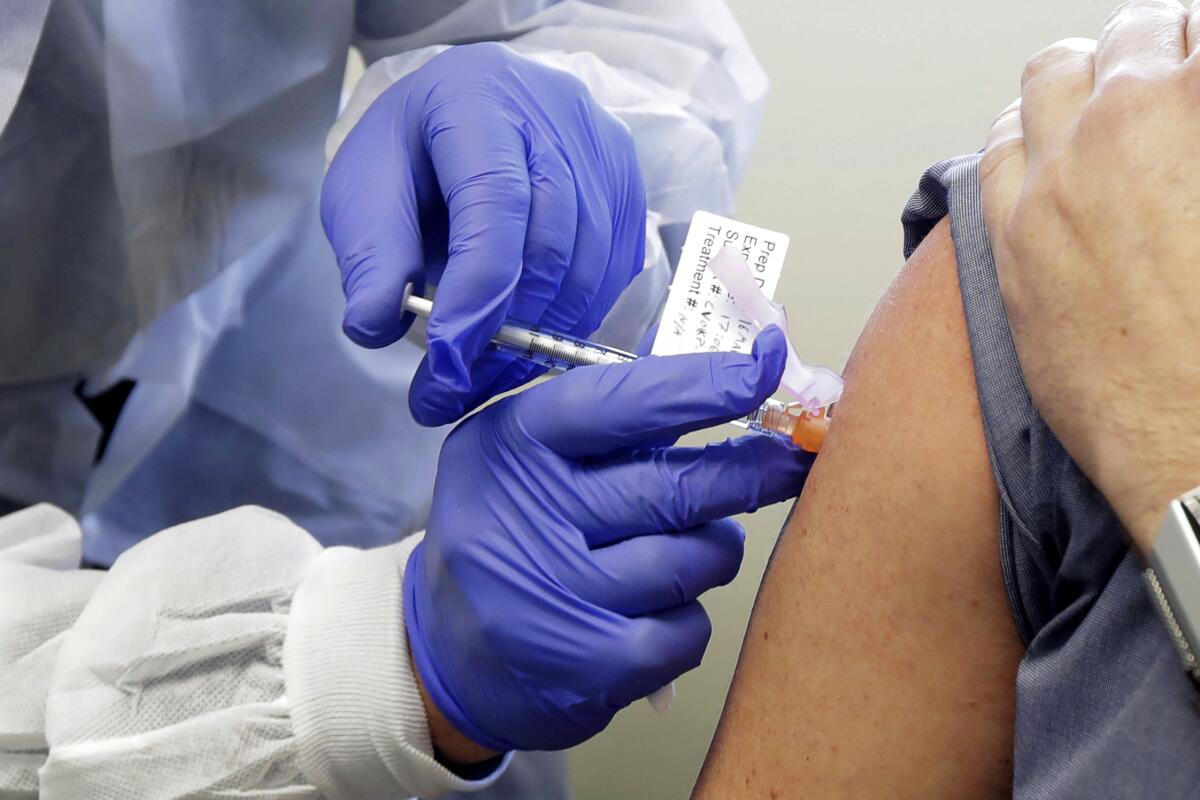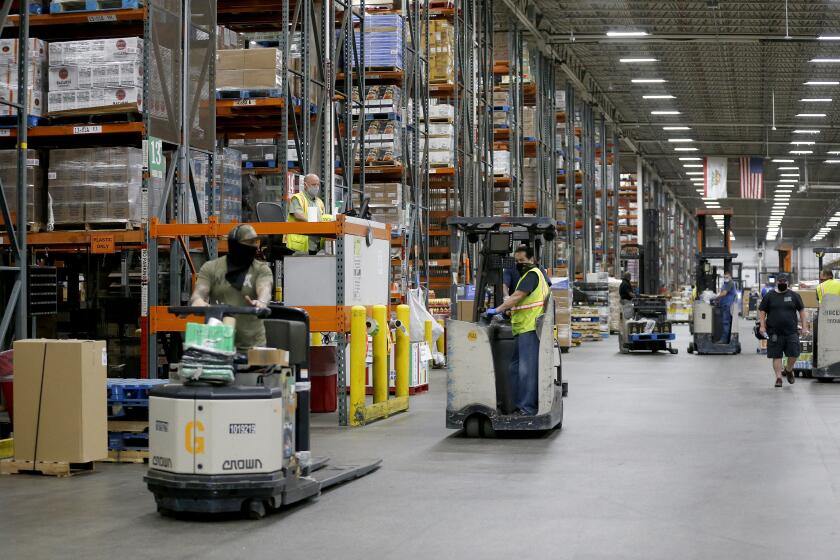Column: Moderna execs sold $29 million in stock after its early vaccine announcement

- Share via
The money-losing biotech firm Moderna thrilled the investment world last week by announcing encouraging results from a COVID-19 vaccine trial.
But few investors may have been more thrilled than four top executives of the firm.
With exquisite timing, in the two days following the announcement they reaped more than $29 million in gains from selling shares in the company. In most cases, they sold at prices near the peak of Moderna’s surge in value after the vaccine announcement. Among the four executives is Chief Financial Officer Lorence Kim, who will be leaving Moderna in August, the company announced May 7.
The optics of this aren’t great.
— Charles Elson, University of Delaware
On the surface, there’s nothing illegal about these stock sales. According to the company and the executives’ government-mandated disclosures, the transactions were all done in accordance with automatic stock sale arrangements aimed at inoculating corporate executives from accusations of insider trading.
“These sales were part of a pre-planned 10b5-1 sales,” Moderna said in a prepared statement. Such sales are common among corporate executives; they’re scheduled in advance so the executives can’t be accused of timing them to profit from non-public information about their companies.
But there was nothing automated about Moderna’s vaccine announcement, which preceded by hours or days the executives’ scheduled stock deals. The timing of the vaccine announcement was entirely under the control of Moderna, which in other contexts has been criticized for being secretive about its data.
The stock market is euphoric over news of a possible coronavirus vaccine. But for now, you shouldn’t be.
Was the timing coincidental? Moderna didn’t reply to my question about that. But it’s something the Securities and Exchange Commission should be examining, because if it wasn’t a coincidence, then that would imply that the company manipulated the stock market for its executives’ benefit.
The stock sales are problematic in several respects. One is that they can signal to investors that company executives may have doubts about its prospects.
“The optics of this aren’t great,” says Charles Elson, a corporate governance expert at the University of Delaware.
Elson is wary of any stock sales by executives during their tenures. “Traditionally, when you leave a company, then you sell,” he told me. “If you sell while you’re there, that doesn’t show a lot of confidence in what you’re doing.” Indeed, several investment advisory services examine buying and selling by corporate insiders for clues about what insiders really think about a company’s prospects.
Another issue is what the executives’ sales might imply about the timing of the company announcement about its vaccine trial. That announcement on Monday, May 18, produced an immediate spike in Moderna’s stock price, which rose by nearly 20% to close at $80 that day after peaking at $87.
Moderna instantly took advantage of the spike by announcing the sale of 17.6 million new shares at $76 each. As we noted at the time, that share price would have been a premium of nearly 14% over the company’s $66.69 price on May 15, the last trading day before the vaccine announcement. But it was a 5% discount to the stock’s price at the May 18 closing.
The shares have since fallen back to less than $62, below its May 15 close. That probably reflects investor concern about the influx of new shares, as well as doubts expressed in the scientific community about the significance of the vaccine trial results.
We reported on the very day of the vaccine announcement that it was based on exceedingly thin data. The full results from only eight trial subjects were disclosed in the announcement, with full results from 37 other subjects withheld. No raw data were disclosed, nor have any results been published following peer-review thus far.
Moderna’s vaccine announcement amid the coronavirus outbreak turbocharged its share offering — is there a connection?
The trial was aimed chiefly at determining whether Moderna’s test vaccine caused troublesome side effects; the company said that only minor side effects were observed among the initial 45 subjects. But many months of further tests involving potentially tens of thousands of human subjects will be needed before the vaccine can be deemed safe and effective against COVID-19 infection and approved by the Food and Drug Administration for wide distribution.
In the judgment of some scientific and medical experts, Moderna’s announcement was premature at best. “This is ‘publication by press release,’” said former Harvard Medical School professor William Haseltine in a Washington Post op-ed, “and it’s damaging trust in the fundamental methods of science and medicine at a time when we need it most.”
As it happens, Moderna has been criticized in the past for not publishing much at all, despite its claim that it has advanced an unusual technique of vaccine development based on messenger RNA, a molecule that transmits instructions from DNA to produce proteins, including antibody proteins, in the body. The firm asserts that using mRNA to create vaccines will shorten the time needed to develop the drugs.
In a 2017 interview with the Financial Times, Moderna’s CEO, Stephane Bancel, defended the firm’s secretiveness as necessary for “competitive reasons.” He told the FT, “We said let’s not teach the world how this works because we’ve invested a lot of money.”
Employers’ gratitude for their ‘hero’ workers didn’t last long
Bancel has been a frequent and steady seller of Moderna shares, having unloaded shares worth more than $4.8 million this month alone. His most recent sales, on May 15 and 20, still left him with roughly 8 million shares in hand, according to SEC disclosures.
Three other top executives exercised stock options to acquire shares and immediately sold the shares on May 18, the day of the vaccine announcement, and the two following days.
Among them was Moderna general counsel Lori M. Henderson, who reported exercising options for 64,000 shares on May 20 and selling them the same day. Options give a holder the right to buy shares at a given price within a set period of time.
Henderson exercised her options at $14.85 per share and sold the shares for $70, producing a gain of more than $3.5 million. Henderson still holds options on 463,522 shares, according to her SEC filing.
Tal Zaks, chief medical officer, exercised options for 125,044 shares at $12.21 and sold the shares for $78.16 on May 19, producing a gain of $8.25 million. Zaks still holds options for nearly 400,000 shares.
Zaks played a leading role in the May 18 announcement. During a conference call with investment analysts that day, he stated that the announced results signified that Moderna’s vaccine was likely to be effective against COVID-19.
“The totality of the science tells us that this is the right antigen and we should be protective,” he said.
Chief Financial Officer Lorence H. Kim exercised options for about 241,000 shares for $14.22 and $12.21 on May 18, and sold the shares the same day for prices ranging from $76.35 to $86.96, for a total gain of $16.8 million. He still holds options for nearly 1 million shares. Moderna hasn’t disclosed why Kim is resigning or whether he has a new job lined up.
More to Read
Inside the business of entertainment
The Wide Shot brings you news, analysis and insights on everything from streaming wars to production — and what it all means for the future.
You may occasionally receive promotional content from the Los Angeles Times.












